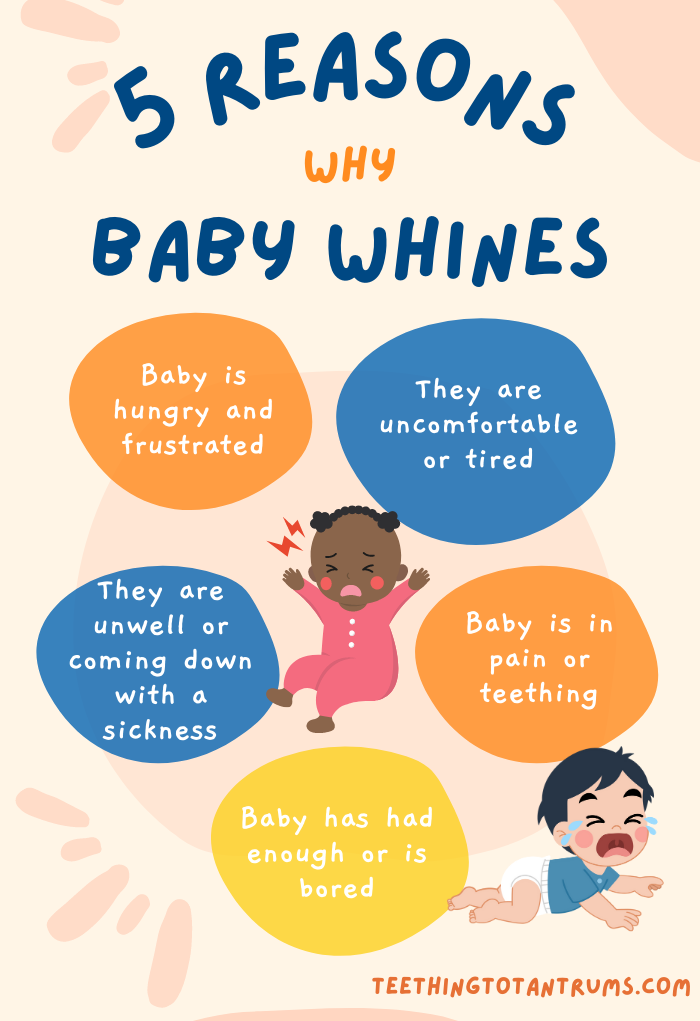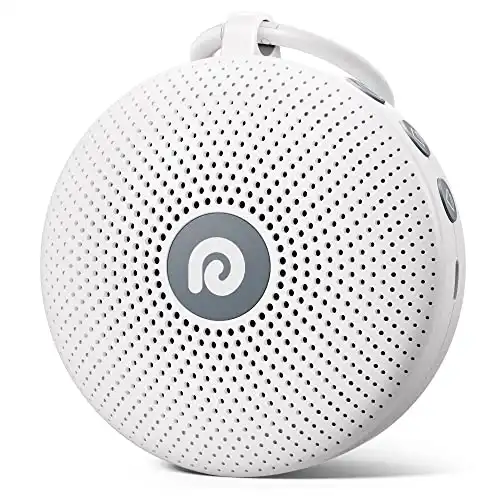When your baby whines can be grating, but it’s also a vital means of communication in the first year of life. As parents, it’s our job to decode what our little ones are trying to tell us.
In this article, we’ll explore how to distinguish between cries for help and cries for attention, so you can have a happy, calm baby once again.
What Is Baby Whining?
Baby whining is what most would call crying. And just like crying, when a baby whines, it is their way of expressing themselves for what they are feeling. Whether that be a wet nappy, a hungry tummy or being a bit cold.
Reasons By Baby Whines
As a new parent, one of the first things you have to learn is how to interpret your baby’s crying.
It is not always easy to know what your baby wants and what each cry means but as you get to know each other you will begin to identify certain behaviours and cries that will give you some indication as to what your baby needs or wants.
There are a few reasons babies get fussy irritable and whiny:

1. I’m Hungry
This is a short, low-pitched cry that is usually accompanied by lip sucking, the rooting reflex and sucking of their fists.
2. I’m Uncomfortable Or Tired
If your baby has a wet or dirty nappy, is feeling too hot or too cold, is in an uncomfortable position or is feeling tired they will give a whiny, nasal cry that will gradually strengthen in intensity if the source of their problem is not solved.
A growth spurt or developmental leap can cause overtiredness which can lead to baby’s whining too.
Your baby will pull at their ears or yawn if they are uncomfortable or tired.
3. I’m Sick
If your baby is feeling unwell they will not have a strong cry but rather a nasal whimper. Look for other signs of illness such as fever, diarrhoea or a rash.
If your baby appears to be lethargic and slow to respond you should seek medical advice.
4. I’m In Pain
You will certainly know if your baby is in pain. They will issue a high-pitched intense wail that will usually be accompanied by a lot of fidgeting.
If colic is the cause they will also pull their legs up towards their tummy.
5. I’ve Had Enough Or I’m Bored
Sometimes babies get bored or tired of playing.
Both situations result in a similar fussy, whiny cry and they will probably turn away from you or any stimulation.
Looking to get your little one to sleep quickly and effortlessly? Check out my Bedtime and Nap Cheat Sheet and master the art of making daytime naps and bedtimes as seamless as possible.
A bedtime & nap cheat sheet so good your little one will ask you to put them to bed...
Laura Williams "This is a life saver! I'm so glad I downloaded your bedtime & nap cheat sheet. My little one actually asked me to put him to bed last night! Unbelievable! Thank you so much!"
Click Here For The FREE Cheat Sheet
Ways To Handle A Whining Baby
Some babies are more prone to whining than others.
But as a parent, a whiny baby can be hugely trying.
You can easily feel that no matter what you do you cannot decipher what is wrong or what your baby wants.
Knowing how to handle your whining baby and what are the most likely causes of whining will go a long way in helping you cope.
Very Young Babies
In very young babies you will need to pay careful attention to the type of cry in order to decipher what they need:
1. Ensure That Your Baby Is Fed Promptly
A hungry baby will require you to act fast.
A whiny baby that progresses to full-blown crying will not be able to feed well and will take in lots of air which is not ideal when breastfeeding or bottle feeding.
2. Swaddle Them
If your baby is tired and whining then they need to be settled to sleep as quickly as possible before they become too upset.
Swaddling your baby will help them feel safe and secure and can help to stop the whining.
3. Always Check Their Nappy
One of the first things to check when your baby whines is to see if they need a nappy change.
This simple act can often solve the whining simply and quickly.
4. Make Them Comfortable
If you suspect your baby is too hot or cold, put on or take off clothes as necessary.
You can tell if a baby is too hot or too cold by placing your hand on their tummy.
5. Cut Down On Social Interaction
Young babies do not really like being handled by different people too much.
And an overtired baby is not a pleasant situation for anyone. So if your baby starts to whine when friends or relatives are over then you will need to step in and take over looking after baby.
6. Fix The Boredom
If your baby is fussy and whiny because they are bored, pick them up and try a change of position or location and you will probably find the whining will stop.
7. Overstimulated
When babies are overstimulated or have had enough playing they may start to whine and fuss.
The best way to deal with this is to take your baby to a quiet place, turn on a white noise machine or sing a lullaby.
White noise machines are a game-changer for your little one's sleep and having one that plays all night is a must. With a long-lasting battery, this compact and stylish white noise machine contains 21 non-stop relaxing noises, which will lull your little one to sleep night after night, no matter where you are!
8. Stay Calm
A whining baby can really test your patience, but remember that they have no other way of letting you know that they are unhappy about something.
So take a couple of deep breaths and don’t be afraid to ask for help.
9. Don’t Forget To Cuddle
Very often a cuddle can solve a lot of problems for young babies.
Holding them and making them feel safe and secure and talking to them softly in a nice voice can often calm them down and put an end to the whining.
A gentle massage of circular motions on their back or tummy can work wonders too.
Older Babies
Dealing with an older baby’s whining is slightly different.
While you will still need to work out the cause of your baby’s whining, there are a host of other things that you can do to avoid them whining and to help them learn other ways to communicate:
1. Ensure They Are Fed On Time And Avoid Overtiredness
Overtiredness and hunger are some of the biggest causes of whining in older babies.
If your baby is hungry or tired and whining you will need to attend to their needs promptly.
2. Make Sure Your Baby Does Not Get Overstimulated
If you suspect your baby is getting overstimulated, then the best thing to do is change location and calm things down.
Go outside in the garden or go for a walk.
3. Acknowledge Their Frustration And Help Them Out
As babies become more physically able they will also become more easily frustrated as they try to do things that they are not yet able to.
If your baby’s whining is due to frustration, acknowledge that you understand how they feel and give them a helping hand to achieve what they want.
4. Ensure Your Baby Is Getting Enough Of Your Attention
Babies will definitely whine if they are feeling ignored.
If your baby is whining because they want your attention, get them involved in what you are doing.
Chat away, show them what you are up to or stop and play with them for a while.
5. Encourage Non-Verbal Communication
Most importantly when your baby whines offer them alternative ways to communicate with basic sign language such as pointing, nodding or shaking their head.
Ask them to show you what they want rather than whine.
6. Encourage Verbal Communication
As your baby reaches 12 months old, they will probably start to use words to communicate.
When your baby whines, start to give them simple words to use instead.
Remember that whining for older babies is the step between crying and talking so giving your baby lots of language learning opportunities will go a long way in reducing the amount of whining you have to contend with.
Frequently Asked Questions About Why Baby Whines
Looking for more information about why baby whines and what you can do about it? Here are the answers to the most frequently asked questions.
Is Baby Whining Normal?
Yes, baby whining is completely normal as it is often the only way your little one can communicate with you before they are able to use proper words.
A baby will cry or whine in order to let you know that they need something or are unhappy about something.
When Will Baby Grow Out Of It?
At around 1 year of age, your baby should start to whine less as they become more adept at using other ways to communicate their needs.
They may have simple words that they can use by this stage but will also be able to use gestures such as pointing, reaching and nodding or shaking their head.
Being more mobile also allows your baby to show you what they need or get it themselves which leads to less frustration and consequently, less whining.
Once they are able to communicate in a more effective manner you should try to encourage your little one not to whine, but rather show them how to use other means of communication to get their point across.
TOP TIP: A whining baby is something that you need to decipher in order to meet their need. But a whining toddler is not something you want to perpetuate so any whining beyond 16 months should be discouraged.
Can The Witching Hour Be To Blame?
If your baby is only fussy and whiny in the late afternoon and early evening then it could just be linked to the phenomenon known as the ‘witching hour’.
Persistent crying at this time of day needs to be dealt with a little differently from normal crying and may be attributed more to your baby’s routine than one specific cause.
NOTE: To learn more about the witching hour, be sure to read my post Baby’s Witching Hour.
What If Nothing Helps Your Whining Baby?
If nothing helps to stop your baby whining, you may have to take a break.
Put your baby in their crib and go and make yourself a cup of tea and return when you are feeling calm and collected.
A persistently whining baby is hard to deal with on your own so ask for help.
Let someone else take your baby for a while to give you a break.
Most babies will grow out of their whining phase once they are more mobile or better able to communicate what they want. Just be consistent and patient.
When To See A Paediatrician About A Whining Baby
If your baby whines for more than 3-4 hours, is lethargic or unresponsive when crying and fussing you should seek medical advice. Always trust your instincts.
If you feel there’s more to your baby’s chronic whining then talk to your paediatrician.
Need More Parenting Help?
- Download our FREE Perfect Sleep Cheat Sheet. It’s a free, easy-to-use and proven formula designed for parents of 0-5 year olds to master the art of consistently undisturbed and restful sleep without the yelling, nagging or exhausting long-winded evenings.
- Check out our Parenting Toolbox. You’ll get access to expertly-chosen products that you can guarantee are the best for your little one and your wallet.
- Ready to create the calm, peaceful evenings you deserve? Then checkout our most popular course - The Bedtime Battles Masterclass

A bedtime & nap cheat sheet so good your little one will ask you to put them to bed...
Laura Williams "This is a life saver! I'm so glad I downloaded your bedtime & nap cheat sheet. My little one actually asked me to put him to bed last night! Unbelievable! Thank you so much!"
Click Here For The FREE Cheat Sheet



